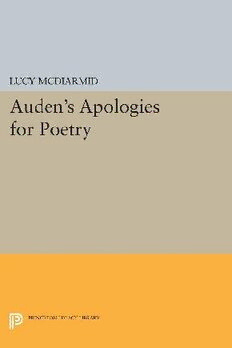
Auden's Apologies for Poetry PDF
Preview Auden's Apologies for Poetry
Auden's Apologies for Poetry Auden's Apologies for Poetry Lucy McDiarmid PRINCETON UNIVERSITY PRESS PRINCETON, NEW JERSEY Copyright © 1990 by Princeton University Press Published by Princeton University Press, 41 William Street, Princeton, New Jersey 08540 In the United Kingdom: Princeton University Press, Oxford All Rights Reserved Library of Congress Cataloging-in-Publication Data McDiarmid, Lucy. Auden's apologies for poetry / Lucy McDiarmid. p. cm. 1. Auden, W. H. (Wystan Hugh), 1907-1973—Criticism and interpretation. 2. Auden, W. H. (Wystan Hugh), 1907-1973— Aesthetics. 3. Poetry. I. Title. PR6001.U4Z757 1990 811'.52—dc20 89-10660 ISBN 0-691-06784-8 (alk. paper) Publication of this book has been aided by a grant from the Paul Mellon Fund of Princeton University Press This book has been composed in Linotron Sabon Princeton University Press books are printed on acid-free paper, and meet the guidelines for permanence and durability of the Committee on Production Guidelines for Book Longevity of the Council on Library Resources Printed in the United States of America by Princeton University Press, Princeton, New Jersey 10 9 8 7 6 5 4 3 2 1 FOR PHILIP J. ESCOLL . . . love, or truth in any serious sense, Like orthodoxy, is a reticence. Contents Preface ix Acknowledgments xv Abbreviations xix INTRODUCTION The Finest Tumbler of His Day 3 CHAPTER ONE Pardon and "Pardon" 14 CHAPTER TWO The Generous Hour: Poems and Plays of the 1930s 46 CHAPTER THREE The Other Side of the Mirror: New Year Letter, For the Time Being, and The Sea and the Mirror 73 CHAPTER FOUR Apologies for Poetry: Poems 1948—1973 119 CONCLUSION Writing This for You to Open When 1 Am Gone 159 Appendix: The Manuscript Drafts of New Year Letter, Part III, Opening Passage 169 Index 173 Preface If good literary critics are rarer than good poets or novelists, one reason is the nature of human ego ism. A poet or novelist has to learn to be humble in the face of his subject matter which is life in gen eral. But the subject matter of a critic, before which he has to learn to be humble, is made up of authors, that is to say, of human individuals, and this kind of humility is much more difficult to acquire. It is far easier to say—"Life is more important than any thing I can say about it"—than to say—"Mr. A's work is more important than anything I can say about it." —Auden, "Reading" AUDEN'S WORK is more important than anything I can say about it. In so encouraging the modesty of literary critics, Mr. A. did not altogether debar their efforts. In spite of "human egoism," Auden conceded, a critic can perform a number of valuable services, such as giving a " 'reading' of a work which increases my understanding of it" (DH 8). This book offers a reading of Auden's work, based in part on Auden's own self-commen tary: on essays that talk about art, on poems that talk about themselves, on poems that rewrite and revise earlier poems by Auden. "Goody." So Auden commented to Christopher Isherwood as the boat-train pulled out of London on 18 January 1939, as he left behind the idealisms of the thirties, all political and social concerns, and the "magnificent early lyrics," to become an unserious poet, or, worse still, a minor poet, his poems empty, agreeable contrivances. Or so the story goes. Spoiled by the intensities of apocalypse, Auden's critics distort and
